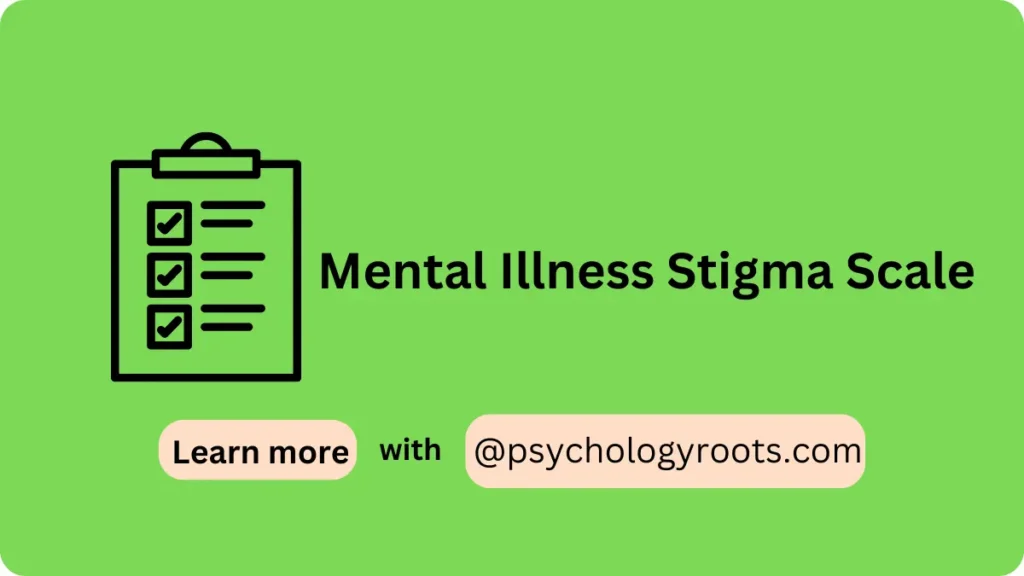Table of Contents
Mental Illness Stigma Scale
Here in this post, we are sharing the “Mental Illness Stigma Scale”. You can read psychometric and Author information. We have thousands of Scales and questionnaires in our collection (See Scales and Questionnaires). You can demand us any scale and questionnaires related to psychology through our community, and we will provide you with a short time. Keep visiting Psychology Roots.
About Mental Illness Stigma Scale
Scale Name
Mental Illness Stigma Scale
Author Details
Emer N. Day, Kara Edgren and Amy Eshleman (esh@wagner.
edu)
Translation Availability
Not Sure

Background/Description
The Mental Illness Stigma Scale (MISS) was developed to measure the stigma associated with mental illness in various populations. Stigma toward mental illness can have profound impacts on individuals’ willingness to seek help, their treatment outcomes, and their overall quality of life. The MISS was designed to capture the multifaceted nature of stigma, including public stigma, self-stigma, and perceived stigma from others.
Stigma is a major barrier to mental health care, contributing to discrimination, social isolation, and reduced access to services. The MISS helps researchers and clinicians understand the extent and nature of these stigmatizing attitudes, both in the general public and among individuals with mental illness themselves. The scale is often used in studies examining the effects of stigma on mental health, as well as in interventions aimed at reducing stigma.
The development of the MISS was based on extensive literature review and psychometric analysis, ensuring that the scale is both reliable and valid. It includes items that assess beliefs about mental illness, attitudes toward people with mental illness, and the internalization of these attitudes by individuals who have mental health conditions.
Administration, Scoring and Interpretation
- Participant Selection: The MISS can be administered to a wide range of populations, including the general public, individuals with mental illness, and specific subgroups such as healthcare providers or students.
- Questionnaire Distribution: The scale is administered as a self-report questionnaire, which can be distributed in paper form or electronically. It is important to ensure anonymity to encourage honest responses.
- Response Format: Participants respond to a series of statements on a Likert scale, typically ranging from 1 (strongly disagree) to 5 (strongly agree). The statements are designed to measure different dimensions of stigma, including beliefs about mental illness and attitudes toward individuals with mental health conditions.
- Scoring: The responses are scored to create a profile of stigma levels across various dimensions. Higher scores indicate stronger stigmatizing attitudes or greater internalization of stigma.
Reliability and Validity
The Mental Illness Stigma Scale has demonstrated strong reliability and validity in various studies. The internal consistency of the scale is high, indicating that the items reliably measure the construct of stigma. The scale has also been validated in diverse populations, making it a versatile tool for research and clinical practice.
The MISS has been shown to correlate with other measures of stigma and related constructs, such as attitudes toward mental illness and discrimination experiences. Its validity is further supported by its ability to predict outcomes such as help-seeking behavior and treatment adherence, which are often negatively affected by stigma.
Available Versions
28-Items
Reference
Day, E. N., Edgren, K., & Eshleman, A. (2007). Measuring stigma toward mental illness: Development and application of the mental illness stigma scale 1. Journal of applied social psychology, 37(10), 2191-2219.
Important Link
Scale File:
Frequently Asked Questions
Q: What is the Mental Illness Stigma Scale (MISS)?
A: The MISS is a self-report questionnaire designed to measure the stigma associated with mental illness, including public stigma, self-stigma, and perceived stigma from others.
Q: Who developed the Mental Illness Stigma Scale?
A: The scale was developed by Day, E. N., & Roberts, M. C.
Q: How is the MISS administered?
A: The MISS is administered as a self-report questionnaire, with participants rating their agreement with statements about mental illness on a Likert scale.
Q: What does the MISS measure?
A: The MISS measures various dimensions of stigma, including beliefs about mental illness, attitudes toward people with mental illness, and the internalization of these attitudes.
Q: How reliable is the MISS?
A: The MISS has demonstrated strong reliability and validity, making it a valuable tool for research and clinical assessment of mental illness stigma.
Disclaimer
Please note that Psychology Roots does not have the right to grant permission for the use of any psychological scales or assessments listed on its website. To use any scale or assessment, you must obtain permission directly from the author or translator of the tool. Psychology Roots provides information about various tools and their administration procedures, but it is your responsibility to obtain proper permissions before using any scale or assessment. If you need further information about an author’s contact details, please submit a query to the Psychology Roots team.
Help Us Improve This Article
Have you discovered an inaccuracy? We put out great effort to give accurate and scientifically trustworthy information to our readers. Please notify us if you discover any typographical or grammatical errors.
Make a comment. We acknowledge and appreciate your efforts.
Share With Us
If you have any scale or any material related to psychology kindly share it with us at psychologyroots@gmail.com. We help others on behalf of you.